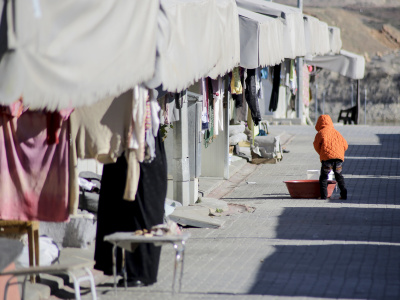
Interview with Aiichiro Yamamoto, Japan International Cooperation Agency’s EU representative
Aiichiro Yamamoto, the Japan International Cooperation Agency’s (JICA) EU representative, talks about how the North-South aid paradigm (rich countries giving aid to poor countries) is transforming it to a partnership model where emerging countries are also becoming donors. These three parties can work together – through triangular cooperation - to solve the common global issues such as climate change and poverty he says. In these two videos, he also outlines the strengths and weaknesses of the European Union’s international development cooperation, and how Japan is keen to work with the EU institutions and Member States if they utilise their potential to work more coherently on complex foreign policy and global development issues.
Aiichiro Yamamoto on Japan's Official Development Assistance
Aiichiro Yamamoto's experience of working with the EU
Want to know more? Read this previous blog post by Geert Laporte, Japan and the EU: Friends of Africa? and this interesting blog post by Magnus Taylor from the RAS. Furthermore, Aiichiro has written for Friends of Europe on Japan as a global development partner that firmly sets out Japan's position on aid. He says, "Japanese public opinion is a firm believer in helping those who help themselves and many Japanese value people who strive for a better life while living in poverty."
Transcript
Andrew Sherriff - European external action programme, ECDPM: We are seeing a lot of change in the world at the moment, and also to the global dimension of poverty – poverty in middle-income countries, former developing countries becoming donors – where does Japan and JICA specifically position itself in this changing development landscape?
Yamamoto: It is very important to note that the paradigm of aid is now changing. In the 20th Century aid was largely given according to the North-South paradigm, that is rich counties giving aid to poor countries. But in the current world there are many emerging countries who are becoming aid donors. The role of traditional donors are in way being diminished.
What Japan is proposing now is to change the mind-set of the North-South paradigm into more global partnership approaches: traditional donors and resource providing countries in the South and beneficiary countries in the South. These three parties can work together to solve the common global issues such as climate change, poverty, agriculture, etc. We propose to call this triangular cooperation.
Sherriff: In relation to the modalities that you actually have, are you adopting or changing those modalities?
Yamamoto: No, I don’t think we have to change the modalities, the current aid modalities in terms of addressing the needs of triangular cooperation. For example, we can provide grants to the countries who provide resources to beneficiary countries.
For example, we supported Cambodian government efforts to share their experience in conflict resolution with East Timor, so we provided funding for East Timorese government officials to visit Cambodia to learn from their experience. So in this case, we provided grants to East Timor. We can also provide grants to emerging economies, for example Brazil has an aid agency called ABC managing the whole Brazilian aid programme for developing countries but their capacity is still very weak in term of managing all their aid programmes and evaluating them.
So we provide technical support to the Brazilian government in terms of managing their own aid programme, so we can use TC facilities. I don’t think we need to change aid modalities in order to address South-South cooperation.
Sherriff: You’re the JICA representative to the EU, if was to push you and ask what are the three strengths of the EU when it comes to international development, and the three weaknesses, what would you choose? As an external interested observer who has experienced those challenges yourself?
Yamamoto: I don’t think I have three or not, but let me start with the strength of the EU. The European Union is a group of 28 countries, now including Croatia, with strong economic and political cultural assets over the long history of Europe.
This, I think, is a huge asset for the EU if they are used more cohesively and in a more coordinated way in term of international cooperation. Each member country has its own strengths and the EU (and particularly the EU development cooperation institutions) should be able to manage all the resources and assets of member states in the way that they can better serve the development of partner countries – particularly in Africa.
As for the weakness: I work in Brussels together with many officials from EU intuitions such as DEVCO, ECO, and EEAS. One thing I noticed is that they don’t talk to each other so often. They sit in their own cocoon, so to speak, with different budget instruments and different notions. What is needed for the EU is to open up the whole fragmented bureaucracy into one platform where member states, as well as the commission, can talk about how to deal with complex global situations. For example there are so many cases where development must link with security assistance – case in point Mali, and potentially Syria. There are so many countries which both need development assistance and security assistance. This is the area where the EU has a potential strength, but nonetheless, EU has not yet utilised its potential in terms of responding to the complex issues in the world. So Japan is very keen to work with the EU if the EU is more united and more cohesive in terms of foreign policy and development.
--
Andrew Sherriff is Head of Programme EU External Action. Follow Andrew on Twitter: @AndrewSherriff
Produced by Clem Silverman, Communications Assistant. Twitter @ClemSilverman

